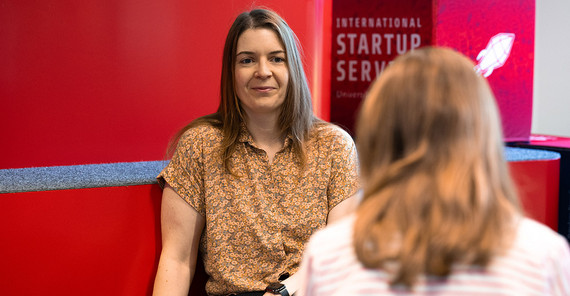Taking research ideas into society
"The potential of science at the university can become understandable and tangible for society as a whole when findings and ideas from research become 'real' through startup projects and young companies. And this is exactly where we provide support," explains Ole Korn from the central scientific institution for start-ups, innovation, knowledge, and technology transfer at the University of Potsdam. To this end, Potsdam Transfer continuously implements projects as part of the federal program EXIST – University-Based Business Start-Ups. The institution supports researchers, students, and alumni with their technology-oriented or knowledge-based startups. "A prerequisite for this is an innovative idea that comes from research," Korn explains. "And when we say 'innovative,' we mean a product or service that solves an existing problem in a novel or more efficient way." In a first step, it can be determined, together with Potsdam Transfer, whether the idea is eligible for funding. Then the Potsdam Transfer team also helps with the application process.
Starting up a business more creatively
Mentors from various scientific disciplines play an important role in a successful application to this program. They support the start-up teams with their expertise in developing the project and can also attribute the funds raised to the chair while Potsdam Transfer takes care of most of the bureaucratic tasks before, during, and after the funding, which is open to all sectors. According to Julia Brennecke, Professor of Business Administration at the University of Potsdam and mentor for start-up teams, this creates ideal conditions for everyone involved. She is already supporting the second project at Potsdam Transfer. “My chair has a strong connection to innovation management and so the connection to business start-ups is obvious. I go through all the steps of starting a business with the Bachelor students.” As a mentor, she contributes her core competencies. “Together with the teams, I look at how they can build innovation-oriented networks in order to access the resources needed to be more innovative, creative, and thus more successful in their start-up.”
Setbacks are part of it
The collaboration is useful and enriching for both sides. As a professor, Brennecke must constantly keep track of three pillars: research, teaching, and transfer. Support with administrative issues and third-party funding management, as it is provided by Potsdam Transfer, is, according to Prof. Brennecke, crucial for her to concentrate on the start-up team and its progress. The team and the mentors always decide together what form the support should take. “It is important to me that I am approachable for the team. For instance, we currently meet for joint lunches in order to share our ideas,” Brennecke explains. Although the transfer of science into practice sounds promising, many researchers doubt their entrepreneurial skills. Ole Korn emphasizes that these doubts are usually unfounded. “Many believe that, as researchers, they don’t have the necessary skills to start a business. But this is a misconception because an entrepreneur needs a lot of the same things that are required in research: you develop ideas, make mistakes, and learn from them. A background in business administration is not necessary either – that’s what Potsdam Transfer’s startup service is for.” Prof. Brennecke emphasizes the importance of having the courage to start a business from the field of science. “Self-motivation, critical thinking skills, and the ability to cope with setbacks are necessary both in science and when starting a business.” This also includes setbacks, which many researchers are already familiar with from rejected publications or third-party funding applications and are thus better able to cope with. The main thing is to get up again and keep going.”
According to Brennecke and Korn, even if the teams don’t end up starting a company, they rate the experience they have gained as positive, apply it elsewhere, or try again with another project. For Prof. Brennecke, providing support as a mentor is also personally enriching. “You always take something with you and learn something new. The teams show me that it’s worth keeping your eyes open for everything that’s out there.”
Applications can be made for up to 150,000 euros in third-party funding for the EXIST Business Start-up Grant and up to 250,000 euros are available for the EXIST Transfer of Research.
Current teams in the program:
(The projects are currently being supervised or are in the application stage.)
Sex tech startup in the field of AI and audio erotica (Mentor: Prof. Brennecke)
Tech startup in the field of AI and ERP systems (Mentor: Prof. Brennecke)
Team in the field of sports, exercise, and health science
Team in the field of chemical recycling of PET
This text (in german language) was published in the university magazine Portal - Zwei 2024 „Europa“ (PDF).

